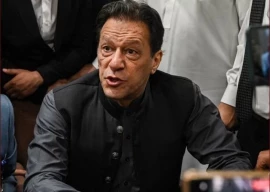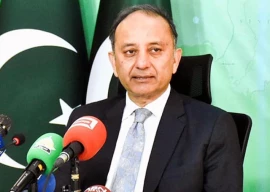
The United States Ambassador to Islamabad, Richard Olson told journalists that Washington does not feel threatened by the growing Pak-China relations, but stressed the need for a level playing field while addressing the media at his residence here on Friday.
“We do not see any competition as long as everyone is given a level playing field,” said the diplomat.
He was answering a question regarding the impact of the Gwadar-Kashgar initiative on America’s New Silk Road, which aims to connect South Asia with Central Asia via Pakistan.
He said that the development of the Gwadar port was consistent with the US plans of expanding regional trade. The ambassador said that the New Silk Road initiative could not be fully materialised due to political, infrastructural and security challenges.

Responding to another question, Olson claimed the US was annually providing $3 billion to Pakistan on account of civil, military assistance and disbursement of the coalition support fund. He added, this year again the civilian assistance will be, by and large, in the range of $800 million to $1 billion.
Olson refrained from commenting on his country’s support for Pakistan in the IMF Executive Board. He said Washington was in general supportive of the new government’s economic policies. He said the IMF programme was still under discussion and has not yet been fully finalised.
The American diplomat also highlighted the significance of the upcoming visit of the Chief Executive Officer (CEO) and President of the Overseas Private Investment Corporation (OPIC), Elizabeth Littlefield, to Pakistan to hold discussions with public and private sector representatives. Littlefield will meet Finance Minister Ishaq Dar, State Bank of Pakistan Governor Yaseen Anwar and other key officials.

The ambassador said OPIC was a very powerful tool for US investment in Pakistan. The OPIC President will brief Pakistani businesses on OPIC projects and highlight OPIC’s existing projects as well as those in the pipeline in Pakistan. Since 1975, OPIC has committed more than $1.3 billion in Pakistan in various investments, Olson said.
While talking about the OPIC, Olson said that it was currently completing due diligence on several projects amounting to $300 million that it wanted to finance in Pakistan. The OPIC was reviewing the possibility of providing insurance for construction of a biomass fueled power plant. It is also considering the possibility of financing wind generation power facilities and financing of an expansion plan of a local micro-finance bank’s mortgage lending portfolio for a housing project. In the agriculture sector too, the OPIC is conducting due diligence to support contract farming, processing, packaging and export of rice, the American ambassador told reporters.
Experts cite broader US strategy to consolidate gains made in Afghanistan to strengthen US grip on Central Asian resources to be used either by the Americans or preferred partners like India, as the motivation behind the New Silk Road. Much like the US, China is also eying to capture regional resources and sees strategically located deep-sea Gwadar port as an emerging hub of commercial activities in the region.
Published in The Express Tribune, July 13th, 2013.
COMMENTS (9)
Comments are moderated and generally will be posted if they are on-topic and not abusive.
For more information, please see our Comments FAQ

1725783822-0/Tribune-Pic-(15)1725783822-0-165x106.webp)






1732513395-0/Copy-of-Untitled-(75)1732513395-0-270x192.webp)








International relation are based on mutual interest. It's never one way traffic. For a long time we remained in USA block as long as it suited them and us. Today interests are shifting again not by fault but by default. For USA, India can play more important role than Pakistan. On the same account for India USA is more important than China. In contrast For US even if Pakistan tries it I hasn't got those resources to take over India. Whereas China as an emerging power. It would like to have as many friends as possible. Also China realises the importance of peace around its borders which is link to its prosperity and progress. As its neighbours it can achieve those advantages which India as a competing neighbour will never be ready to provide. In 21ist Century America will always maintain relation with Pakistan but its dimension and nature will change. This is what we both Pakistan and USA has to understand and to come to term with. And more so Pakistanis. It's the same way as Chinese wants to have economical relation with India but their nature is not strategic as they see each other eye to eye. Absolutely this is the right time to change our ways not not to harm any one but for our own survival.
The Chinese do not need the gawadar port for the trade. The cost of transportation from going Gawadar to the KKH will be enormous.
Currently the US pays $7k for just container to be transported from Karachi to Kandahar while a full container from Karachi to New York costs less than $2500. And if the container is coming from Shanghai to Los Angles it costs less than $2000.
I am not sure costs advantages are being discussed here.
As long as there is peace China does not need Pakistani routes.
I think the US is trying to to throw this problem into Chinese lap.
This is my second post addressed to you, provided Express Tribune publishes the first.
Sadly, countries are no Mother Teresas my friend. No state does anything purely for free. And the Karakoram Highway was built in the 1960's, while many Indians were deriding the venture for the same terrain relied points you have just mentioned. Actually, I do know someone who crossed from Kazakhstan to Xinkiang and then through Kashgar into Gilgit along the KKH.
Naturally the relationship is one sided. China is a country with 8 times the area and population. In fact, China's trade relationship with the US is also highly lopsided. Same goes for China's trade relationship with India and most of Europe.
That is actually a very basic fact that I'd expect a Hedgefunder to be aware of.
Naturally, China is using Pakistan. Gwadar offers it the shortest route to highly lucrative Middle Eastern markets. And your example about a Sri Lankan port is absurd. Please consult a map - For Chinese goods to reach the Middle East through that route, they'd have to circumnavigate most of South East Asia.
Gwadar eliminates the need for China to use the Straits of Malacca completely. And Pakistan stands to benefit immensely from the transit duties, and economic development in Balochistan to accommodate the necessary infrastructure for such a vital road.
Kudos my friend. I am only offering another (more internationally accepted) perspective. Pakistan isn't developing Gwadar or links with the world's second largest country and emerging superpower out of the love in its heart.
@Addressed to Hedgefunder:
Yes I am well aware as to this highway ! Are you familiar with the terrain and the logistics involved ? Have figured out as to the traffic of trade and which direction is being flooded by the goods ? Have you tried to cross the border as Pakistani national, into China thru this post ? Rest assure you will have another opinion, as to this relationship ! It is a one way traffic ! Nothing else, and when it matters, these friend is never around to support you ! As they don't believe in anything for FREE !
My friend, kindly Google the "Karokaram Highway"
And stop making uninformed remarks.
US is interfering it Pakistan-China economic relations because now US knows that thus US shall loose its supremacy and control over Pakistan and South East Asian region gradually.....